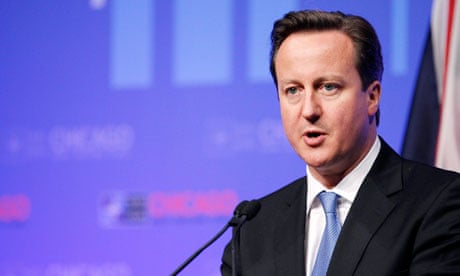Britain could be asked to underwrite up to €6bn (£4.8bn) towards a bailout of Greece if the country exits the euro, according to a thinkthank report released on Monday.
David Cameron may also face calls for concessions including a referendum on EU membership if a Greek exit prompts full treaty change, a report by Open Europe said.
There are growing concerns about the consequences should Athens leave the euro in a so-called "Grexit", which have escalated in the runup to the Greek general election on 17 June.
Raoul Ruparel, head of economic research at Open Europe, has predicted that the new government in Athens is likely to reach a deal with creditors, allowing the country to remain in the euro temporarily. "However, as Greece approaches a balanced budget and a more stable banking sector, though still messy, an exit will look increasingly attractive," he said.
The total cost of supporting Greece if it left the currency could be anything between €67bn and €259bn in external and immediate short-term support – in addition to longer-term costs or contagion affecting markets – according to Open Europe.
"This support could potentially be split between the IMF, the eurozone and non-euro countries, with the UK possibly underwriting between €4bn and €6bn of the entire rescue package," the thinkthank said.
British taxpayers have so far avoided any direct contribution to the temporary bailout fund, the European financial stability facility and its imminent successor, the European stability mechanism.
Cameron has said that he has won assurances from the EU that Britain would not have to contribute to any fresh rescue for Greece.
But Open Europe argues the UK would be likely to take part through the IMF. The UK underwrites about 13% of the fund, which still contains €35bn, which would mean that British taxpayers would be involved if it were deployed to aid Greece. The government is likely to dismiss the Open Europe report as speculative.
Separately, it is possible that Greece could end up benefiting from an existing "balance of payments assistance" facility which was set up to help EU countries outside the eurozone and has in the past been used to help Hungary and Romania.
Douglas Carswell, a Tory backbencher, said that he expected euro exits from Greece and other countries: "Whether that happens, or if the euro survives … it will change our relationship with the rest of the EU and we will want to come up with something very, very different," he told the Financial Times.









